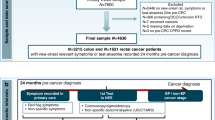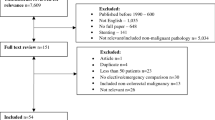Abstract
The objective of this study was to compare the pre-hospital health care process, clinical characteristics at admission and survival of patients with a digestive tract cancer first admitted to hospital either electively or via the emergency department. The study involved cross-sectional analysis of information elicited through personal interview and prospective follow-up. The setting was a 450-bed public teaching hospital primarily serving a low-income area of Barcelona, Catalonia, Spain. Two hundred and forty-eight symptomatic patients were studied, who had cancer of the oesophagus (n = 31), stomach (n = 70), colon (n = 82) and rectum (n = 65). The main outcome measures were stage, type and intention of treatment and time elapsed from admission to surgery; the relative risk of death was calculated using Cox's regression. There were 161 (65%) patients admitted via the emergency department and 87 (35%) electively. The type of physician seen at the first pre-hospital visit had more often been a general practitioner in the emergency than in the elective group (89% vs 75%, P < 0.01). Emergency patients had seen a lower number of physicians from symptom onset until admission, but two-thirds had made repeated visits to a primary care physician. Emergency patients were less likely to have a localized tumour and a diagnosis of cancer at admission, and surgery as the initial treatment. Median survival was 30 months for elective patients and 8 months for emergency patients (P < 0.001), and the relative risk of death (RR) was 1.83 (95% confidence interval, CI, 1.32-2.54). After adjustment for strong prognostic factors, emergency patients continued to experience a significant excess risk (RR = 1.58; CI 1.10-2.27). In conclusion, in digestive tract cancers, admission to hospital via the emergency department is a clinically important marker of a poorer prognosis. Emergency departments can only partly counterbalance deficiencies in the effectiveness of and integration among the different levels of the health system.
This is a preview of subscription content, access via your institution
Access options
Subscribe to this journal
Receive 24 print issues and online access
$259.00 per year
only $10.79 per issue
Buy this article
- Purchase on Springer Link
- Instant access to full article PDF
Prices may be subject to local taxes which are calculated during checkout
Similar content being viewed by others
Author information
Authors and Affiliations
Rights and permissions
About this article
Cite this article
Porta, M., Fernandez, E., Belloc, J. et al. Emergency admission for cancer: a matter of survival?. Br J Cancer 77, 477–484 (1998). https://doi.org/10.1038/bjc.1998.76
Issue Date:
DOI: https://doi.org/10.1038/bjc.1998.76
This article is cited by
-
Histotype influences emergency presentation and prognosis in colon cancer surgery
Langenbeck's Archives of Surgery (2019)
-
Trends in lung cancer emergency presentation in England, 2006–2013: is there a pattern by general practice?
BMC Cancer (2018)
-
Retrospective study of unplanned hospital admission for metastatic cancer patients visiting the emergency department
Supportive Care in Cancer (2017)
-
Caution: work in progress
European Journal of Epidemiology (2016)
-
Cancer diagnosed by emergency admission in England: an observational study using the general practice research database
BMC Health Services Research (2013)



